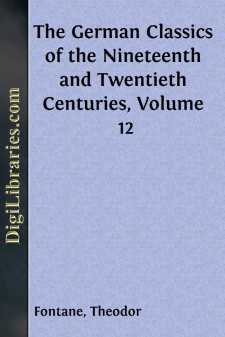Categories
- Antiques & Collectibles 13
- Architecture 36
- Art 48
- Bibles 22
- Biography & Autobiography 813
- Body, Mind & Spirit 142
- Business & Economics 28
- Children's Books 15
- Children's Fiction 12
- Computers 4
- Cooking 94
- Crafts & Hobbies 4
- Drama 346
- Education 46
- Family & Relationships 57
- Fiction 11828
- Games 19
- Gardening 17
- Health & Fitness 34
- History 1377
- House & Home 1
- Humor 147
- Juvenile Fiction 1873
- Juvenile Nonfiction 202
- Language Arts & Disciplines 88
- Law 16
- Literary Collections 686
- Literary Criticism 179
- Mathematics 13
- Medical 41
- Music 40
- Nature 179
- Non-Classifiable 1768
- Performing Arts 7
- Periodicals 1453
- Philosophy 64
- Photography 2
- Poetry 896
- Political Science 203
- Psychology 42
- Reference 154
- Religion 513
- Science 126
- Self-Help 84
- Social Science 81
- Sports & Recreation 34
- Study Aids 3
- Technology & Engineering 59
- Transportation 23
- Travel 463
- True Crime 29
The German Classics of the Nineteenth and Twentieth Centuries, Volume 12
by: Theodor Fontane
Categories:
Description:
Excerpt
THE LIFE OF GUSTAV FREYTAG
By ERNEST F. HENDERSON, PH.D., L.H.D.
Author of A History of Germany in the Middle Ages; A Short History of
Germany, etc.
It is difficult to assign to Gustav Freytag his exact niche in the hall of fame, because of his many-sidedness. He wrote one novel of which the statement has been made by an eminent French critic that no book in the German language, with the exception of the Bible, has enjoyed in its day so wide a circulation; he wrote one comedy which for years was more frequently played than any other on the German stage; he wrote a series of historical sketches—Pictures of the German Past he calls them—which hold a unique place in German literature, being as charming in style as they are sound in scholarship. Add to these a work on the principles of dramatic criticism that is referred to with respect by the very latest writers on the subject, an important biography, a second very successful novel, and a series of six historical romances that vary in interest, indeed, but that are a noble monument to his own nation and that, alone, would have made him famous.
As a novelist Freytag is often compared with Charles Dickens, largely on account of the humor that so frequently breaks forth from his pages. It is a different kind of humor, not so obstreperous, not so exaggerated, but it helps to lighten the whole in much the same way. One moment it is an incongruous simile, at another a bit of sly satire; now infinitely small things are spoken of as though they were great, and again we have the reverse.
It is in his famous comedy, The Journalists, which appeared in 1853, that Freytag displays his humor to its best advantage. Some of the situations themselves, without being farcical, are exceedingly amusing, as when the Colonel, five minutes after declaiming against the ambition of journalists and politicians, and enumerating the different forms under which it is concealed, lets his own ambition run away with him and is won by the very same arts he has just been denouncing. Again, Bolz's capture of the wine-merchant Piepenbrink at the ball given under the auspices of the rival party is very cleverly described indeed. There is a difference of opinion as to whether or not Bolz was inventing the whole dramatic story of his rescue by Oldendorf, but there can be no difference of opinion as to the comicality of the scene that follows, where, under the very eyes of his rivals and with the consent of the husband, Bolz prepares to kiss Mrs. Piepenbrink. The play abounds with curious little bits of satire, quaint similes and unexpected exaggerations. "There is so much that happens," says Bolz in his editorial capacity, "and so tremendously much that does not happen, that an honest reporter should never be at a loss for novelties." Playing dominoes with polar bears, teaching seals the rudiments of journalism, waking up as an owl with tufts of feathers for ears and a mouse in one's beak, are essentially Freytagian conceptions; and no one else could so well have expressed Bolz's indifference to further surprises—they may tell him if they will that some one has left a hundred millions for the purpose of painting all negroes white, or of making Africa four-cornered; but he, Bolz, has reached a state of mind where he will accept as truth anything and everything....



